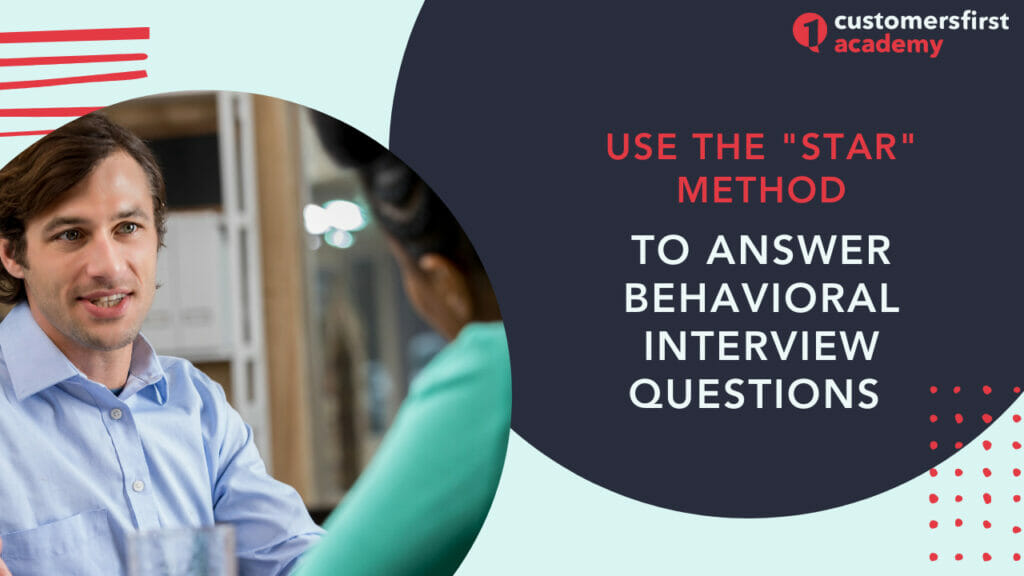One of the most challenging parts of working in a customer-facing job is dealing with angry customers. Sometimes, it can be hard to control your emotions when presented with a difficult situation, but this can and should be done to maintain professionalism and ensure customer satisfaction.
“How would you handle an angry customer?” is a common interview question you hear when applying for a new job. Read our blog post as we provide you with effective strategies and examples to impress the interviewer and help you stand out from other job candidates.

How to answer questions about dealing with difficult customers?
When a hiring manager asks you, “How would you handle an angry customer?” it is likely that they are looking for specific examples of how you dealt with difficult customers and situations in the past.
They often ask this question to assess your ability to handle conflict and ensure customer satisfaction. They want to know whether you can stay cool under pressure when dealing with difficult customers or if you lose your temper easily.
The best way to answer this question and provide an outstanding response is using the STAR method.
Interviewers often use the STAR method to assess a candidate’s problem-solving skills. This method involves providing a specific example of a time you handled a challenging situation while describing the results of your actions and any lessons you learned.
Use the STAR method to answer interview questions
1) Situation
STAR is an acronym that stands for “Situation, Task, Action, and Result.” Let’s cover each one in more detail:
This involves first describing the situation.
- What was happening?
- What was your role?
- What did the customer want?
- How were they acting?
Explain the situation in a couple of sentences.
Focus on your experiences in order to show your ability to cope with challenging situations. If you’ve dealt with a difficult customer before, try to recall what happened during the situation and how you were able to resolve it smoothly.
For example:
“When I was working at ABC Company, I had an instance where a customer was very upset. She had just paid a large sum of money for an order which turned out to be incorrect and was missing items from the list.”
2) Task
You need to state what exactly your job was during this time.
- What were you responsible for doing?
- Were you in charge of handling the situation or escalating the issue to upper management?
- What was your role?
For example:
“As a Customer Support Representative, I needed to provide a solution that would result in the best possible customer service experience while maintaining company standards. My job was to handle the situation professionally, collect customer feedback, and ensure customer satisfaction.”
3) Action
This is the action that you were required to complete to resolve the situation. In this step, you want to explain what actions you took or words you said to address the customer’s concerns and gain their satisfaction by providing excellent customer service.
Let’s continue with the example above:
“First, I listened attentively to the customer by showing empathy and asking clarifying questions. Then, I apologized for the confusion and took ownership of the situation.
I made sure to speak with her in a calm manner and explain what could be done to solve the problem.
I offered different options so she could choose the best path for her. I ended up providing a refund for the missing items and offered free shipping on her next order.”
Listen to this tutorial to learn how to become a more effective listener and improve your interactions with customers!
4) Result
The result is what happened after you took action or completed your task. This should show how satisfied the customer was with your actions and how this situation ended.
- Was the customer satisfied with the outcome?
- Did they stop complaining?
- Did they continue to be upset?
- What was their tone when they spoke to you after the situation was resolved?
Example:
“After I gave her the discount, the customer was very pleased with this solution and thanked me for providing high-quality service.
She sounded much calmer after this discussion and was friendly with me for the rest of the interaction. In fact, she ended up placing another large order later that day and leaving a 5-star review!”

Why use the STAR method during an interview?
The STAR method is a great way to demonstrate that you can handle difficult situations, remain calm under pressure, and solve problems.
It also helps you provide a more personalized response tailored to your situation by sharing related examples that will allow the interviewer to see what type of person you are.
It highlights your course of action and demonstrates your strengths. It’s an effective strategy to communicate your skills and abilities in a way that will impress the hiring manager.
The STAR method also helps you avoid fumbling around with your words when answering difficult interview questions. It helps you to organize your thoughts and present them in a logical manner.
At last, it shows that you are passionate about providing excellent customer service and sets you apart from other job seekers.
Understanding behavioral interview questions
Interviewers use behavioral interview questions to better understand how you would respond in real-life scenarios. They want to find out if you have the skills and attitude that meet their needs.
Their goal is to learn about your experiences and how you’d act in hypothetical customer service situations. This information will be used to determine if you are the best fit for the job.
For example, if you are applying for a management role, they may want to know how well you worked on a team in the past. Or, if you have experience supervising others, they may ask how you dealt with a difficult employee.
This means that you need to explain why your past actions were successful or what you learned from previous work experiences. It’s a great opportunity to show why your personality, skills, and customer service approach match the job description.
Tips for explaining how you handle angry customers
Let’s look at some additional tips to help you master the STAR method when it comes time to answer this type of question.
Answer the interview question directly
Don’t lead off with a long story that provides more context than the question asks for. Too much information is not helpful to the interviewer, and they will likely find it difficult to follow along. It’s also a waste of time for everyone involved.
Avoid answers that are too vague in nature. The interviewer is looking for very specific things, so you need to give them the most precise answer possible.
If you need a minute to think, simply ask the interviewer to take a minute to formulate your answer. This is a better approach than providing a vague response that doesn’t answer the interview question.
Highlight your skills
Answering this interview question is a great opportunity to highlight your customer service skills. Try to find the most relevant examples to illustrate how you meet the job requirements. If you can do this throughout your interview, it will increase your chances of getting hired.
Keep in mind that there is a difference between confidence and arrogance. Companies prefer to hire employees who are confident yet humble enough to work with all types of people.
Be careful not to come across as arrogant during an interview, as this might turn off an interviewer.

Improve your listening skills and transform the way you communicate with customers!
What you can say about dealing with difficult customers
Let’s look at some examples of things you can say about dealing with difficult customers and addressing customer complaints.
Sample answers
“I think treating angry customers with empathy and respect goes a long way.
I’d start by trying to understand the circumstances that led them to be upset, and then find a solution that works for both them and the company.”
Another example:
“In working with customers, I realize the importance of being nonjudgmental.
No matter how someone presents themselves, there is always something going on in their life that has led them to act this way.
This reminds me to put myself in the customer’s shoes and handle difficult customers and customer complaints with more tact.”
And another:
“Being responsible for handling customer complaints in my previous job allowed me to fine-tune my skills in dealing with all types of personalities.
As a customer service representative, I needed to provide great customer service when dealing with difficult clients.
I was able to achieve this by being empathetic and using my communication skills to build trust and rapport with unhappy customers.”
And one more:
” I find that negative customer feedback is important to the company, and it’s equally important for customers to feel heard. It’s an opportunity for growth.
I would want customers to know that by providing feedback, they are helping me and other employees do a better job in the future.”
So, as you can see with these examples, it’s good to keep your answer concise and stick to the point of what you’re trying to say.
Whatever examples you choose, make sure you can address what makes you qualified for the job!
How NOT to answer the difficult customer question?
Let’s also look at some ways NOT to answer this question.
This is the quickest way to get eliminated from a job interview, so make sure you’re well prepared with some sample answers on approaching unhappy customers.
Here are a few examples of things not to do:
Avoid being too vague by providing generic answers. For example, saying things like “I would take full responsibility” or “it is my job to solve the problem” without giving more detail.
Don’t badmouth previous employers or clients. You never know who will be interviewing you or who that person knows!
Avoid coming across as arrogant. Even if you’re qualified for the job, people don’t like to work with someone who is overly confident and boastful.
Don’t use negative examples. Your answer should highlight your best qualities.
Don’t just “wing it.” You could lose the job opportunity if you are not prepared for the interview in advance. Practice answering customer service interview questions before your interview.
Demonstrate essential customer service skills
Maintaining a positive attitude, resolving customer complaints and identifying customer needs are essential skills for any successful customer service representative.
If you can show that you possess these skills during an interview, you increase your chances of getting hired for the job.
To prepare for the interview, carefully read through the job description and note down the essential customer service skills that are required for the position.
For example, a customer service representative must have strong verbal and written communication skills to communicate with customers effectively.
They must also possess a good phone manner, as well as the ability to resolve complaints quickly and efficiently when on a call with a customer.
Keep these criteria in mind when responding to the difficult customer question, and be sure to include relevant examples in your answer.
Explain how you handle customer complaints
If you are currently employed as a customer service representative or have held this position in the past, you probably have some experience dealing with unhappy customers.
When explaining how you handle customer complaints, it’s best to use a work-related example. The interviewer is not interested in hearing about when your neighbor was mad at you because you didn’t pick up after your dog.
When talking about complaints, focus on the positive. The interviewer wants to see that you have a positive attitude regarding your work and dealing with difficult customers.
Here’s a sample answer:
“I think it’s important to maintain an open line of communication with customers.
If a customer is unhappy with the service they’ve received, I will listen to their complaint and work with them to resolve any issues.”
Highlight your credentials
Don’t forget to tell the recruiter about any other essential training that might be helpful for the job, such as previous courses or accreditation in a related subject.
For example:
“I completed a workshop on conflict resolution strategies that taught me how to handle difficult people and become a stronger communicator.”
What to say if you don’t have previous experience
Suppose you don’t have any previous customer service experience.
In that case, you can still approach the difficult customer question by highlighting your personal and work-related skills that will help you succeed in this position.
To prepare for the question, write down 3-to 4 of your key strengths as they relate to customer service. Then use those examples when answering this type of interview question.
For example:
“I have always been extremely patient with other people, no matter how angry or rude they are. I stay calm under pressure, which helps me come up with good solutions.
For example, as a college student, I had to complete a group research project. The other team members were constantly arguing with each other and not taking their work seriously.
This resulted in a lot of stress and frustration with our professor, but I was able to help the group work together better and turn in a good final result. We ended up earning an A+ grade for the project.”
Then you can say:
“I think those qualities would help me do well as a customer service representative. I am very patient, and I enjoy overcoming challenges to reach positive outcomes.”
Show and tell
The interviewer wants to see that you are not just telling them that you have these skills but also showing them how you use your talents in the workplace.
Make sure to explain HOW you would handle challenging customers and what you’ve done in the past.
For example:
“I listened carefully to my team’s complaints and set up a meeting to discuss our challenges together. By bringing everyone’s voice into the conversation, we were able to come up with an efficient plan for dividing work between team members.”
End the response on a high note
Once you’ve provided a great response to this interview question, it’s important to sum everything up with a final statement.
This is your chance to leave the interviewer feeling confident about your ability to handle this type of situation in the future.
Be sure to use a word or phrase that summarizes what you have discussed.
Example
“Over the past two years of working as a customer service representative, I’ve learned that it’s important to listen carefully and spend time working with the customer to ensure they are satisfied.
By demonstrating this type of professionalism, my customers have come back to me many times for additional services.”
Conclusion
Now that you know a little more about answering customer service interview questions, it’s time for you to get out there and start practicing.
The best way to do this is by role-playing with friends or family members. Have them ask you interview questions to get comfortable answering under pressure. Rehearse your answers and ask for their feedback on how you can improve.
You may even want to consider doing some practice interviews with potential employers. By preparing ahead of time, you’ll increase your chances of getting your dream job!
